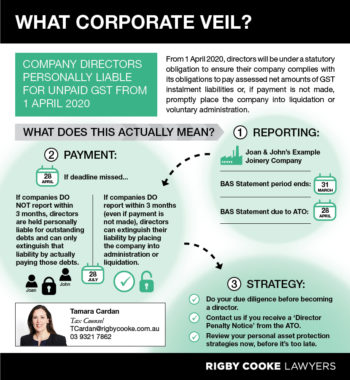Since 1 April 2020, in a significant extension to the director penalty regime, company directors are now personally liable for unpaid Goods and Services Tax (GST) (including luxury car tax and wine equalisation tax). The expansion of the regime was introduced as part of the Government’s broader reform of Australia’s corporate insolvency regime.
The director penalty regime operates to hold directors personally liable for specified tax liabilities of their company. Prior to its expansion to GST, the regime applied to a company’s unpaid pay-as-you-go (PAYG) withholding and superannuation guarantee liabilities.*
As many businesses are suffering from reduced cash flow due to the impact of COVID-19, directors are at a heightened risk of exposure to personal liability for tax debts where their company simply cannot pay its taxes and superannuation.
While the Australian Taxation Office (ATO) is offering administrative relief to businesses experiencing financial difficulty, directors will not be absolved from their personal liability under the director penalty regime.
The business activity statement (BAS) lodgment date of 28 July 2020 for Quarter 4 is fast approaching for many businesses. Where a BAS agent lodgment concession applies, the lodgment date is 25 August 2020. It is essential that these lodgment deadlines are met, which will ensure that directors have several options to remit their liability under the director penalty regime without the need to pay outstanding tax.
View our snapshot infographic:
How does the director penalty regime apply to GST?
With effect from the June quarter 2020, directors are now under a statutory obligation to ensure their company complies with its obligations to pay assessed net amounts of GST instalment liabilities or, if payment is not made, promptly place the company into liquidation or voluntary administration.
This statutory obligation on directors commences on the ‘initial day’ – this is the last day of a tax period or GST instalment quarter. Persons who were directors on the ‘initial day’ will be personally liable for any GST liability which has not been paid by the ‘due day’, being the date the assessed net amount of GST instalment is payable.
For instance, for the September quarter, the initial day is 30 September. Persons who were directors on 30 September will become personally liable for any GST liability that has not been paid by 28 October, the due day.
The penalty arises automatically, unless the company has been placed into liquidation or voluntary administration on or before the due day.
New directors appointed after the due day will become subject to the penalty if the GST liability remains unpaid for a further 30 days. In this instance, the penalty will be due and payable at the end of that 30th day.
How can a director satisfy their personal liability?
The methods by which a director can absolve themselves of personal liability wholly depends on whether the ATO was notified of the liability within three months after the due day.
As an initial point, the ATO may only seek to actually recover a director penalty following a period of 21 days from when the Commissioner of Taxation (Commissioner) issues a director penalty notice (DPN) to a director. It is vital for directors to be aware that the 21-day period commences from the date of posting of the DPN, rather than the date of receipt.
A director penalty may generally be remitted by the ATO if, before a DPN is issued, or within the 21-day period after the DPN is issued, the company pays the liability, or an administrator or liquidator are appointed.
However, where three months have lapsed after the due day, and the GST liability remains unpaid and unreported to the ATO, the director penalty cannot be remitted by the director placing the company into administration or commencing to wind it up. The penalty is ‘locked down’ and the only way to obtain remission is to make full payment of the liability.
It is therefore critical that directors report their company’s GST liability to the Commissioner within this three-month period, even if payment of the underlying liability is not made.
For instance, in respect of GST quarterly reporting, the relevant reporting dates are as follows:
| Quarter | Initial Day | Due Day | LOCKDOWN DATE |
| July – Sept (Q1) | 30 September | 20 October | 28 January |
| Oct – Dec (Q2) | 31 December | 28 February | 28 May |
| Juan – March (Q3) | 31 March | 28 April | 28 July |
| April – June (Q4) | 30 June | 28 July | 28 October |
For example, a company’s BAS for the December quarter is due for lodgment on 28 February. Persons who were directors on the initial day (ie 31 December) will become personally liable for any GST liability that remains unpaid by the due day. The BAS for the December quarter must be lodged by 28 May, the lockdown date, to ensure that directors can achieve remission by placing the company into administration or liquidation.
Lodgment of the BAS within the three-month period will have the following consequences:
- The directors may place the company into administration or liquidation at any time before a DPN is issued. The penalty will be remitted in these circumstances. Once a DPN is issued, the penalty will be remitted by placing the company into administration or liquidation within the 21-day period.
Failure to lodge the BAS within the three-month period will have the following consequences:
- The penalty will not be remitted by placing the company into administration or liquidation in any circumstances. These steps would only achieve effective remission if actually done within the three-month period, before lockdown date.
- Once a DPN is issued, the only way to obtain remission is to pay the penalty in full, and the ATO will pursue the director for payment.
Accordingly, it is critical to ensure that all BAS and GST returns are lodged on time, and before the lockdown date. If there is any delay in lodging a BAS, companies should promptly seek an extension of time for lodgment with the ATO.
How can Rigby Cooke help?
The director penalty regime is complex, and the above information is a brief snapshot of the critical aspects of the regime. We can provide you with further detailed advice regarding the application of the regime to your particular circumstances.
The extension of the director penalty regime to GST will impact many companies and result in directors being at significant risk of being held to account for inadvertent oversights and systemic errors. Directors will need to be more actively involved in their company’s GST reporting processes and have a greater understanding of the operation of the GST system.
The extension of the regime will increase the extent to which directors’ assets will be at risk, particularly in an insolvency. We can work with you to ensure you have adequate asset protection structures in place.
Individuals who are considering accepting a directorship must be vigilant and conduct thorough due diligence in respect of the company’s solvency, tax compliance history, and internal systems for remitting PAYG withholding amounts, and paying superannuation guarantee and GST to ensure these systems are adequate. If you are considering accepting a directorship, we can assist you in conducting this due diligence process.
Further, individuals who are ‘sleeping’ or passive directors may wish to consider resigning from their roles, due to the heightened risk of exposure under the broadened director penalty regime. It is important to also note that the director penalty regime applies to directors of corporate trustees.
If you have been issued with a DPN, we can make submissions to the ATO to assist in the remission of your liabilities or negotiate payment plans. If you are concerned that your company may not be able to pay its tax liabilities due to the impact of COVID-19, we recommend early engagement with the ATO to negotiate deferral arrangements and remission of accrued interest charges.
You can view our previous advice on this topic, What corporate veil? Company directors personally liable for unpaid GST or for further advice please contact our Tax and Wealth team.
*The director penalty regime also applies to estimates of PAYG withholding amounts and superannuation guarantee charges, and liabilities in respect of alienated personal services payments and non-cash benefits.
| Disclaimer: This publication contains comments of a general nature only and is provided as an information service. It is not intended to be relied upon as, nor is it a substitute for specific professional advice. No responsibility can be accepted by Rigby Cooke Lawyers or the authors for loss occasioned to any person doing anything as a result of any material in this publication.
Liability limited by a scheme approved under Professional Standards Legislation. ©2020 Rigby Cooke Lawyers |

